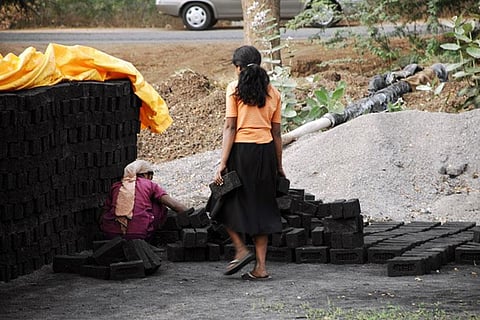

For three years, they were denied their freedom, with only the men allowed to venture to the market once a week. They had to leave their families behind at the brick kiln to ensure they would return. After 14 hours of backbreaking work making bricks, a family which had three people working earned only Rs 400 to 500 a week, amounting to just Rs 28 per person per day, at most. This was the life of 12 men, women and children from the Sabara community, a Scheduled Tribe from Odisha, who were trafficked to Devanahalli in Bengaluru Rural district.
Now, 12 years after they were rescued in 2008 with the help of International Justice Mission (an NGO that works against bonded labour and other forms of violent oppression), they have finally gotten justice with the Additional Sessions Court in Bengaluru Rural district convicting the brick kiln owner to three years of imprisonment and a fine of Rs 52,000 under section 18 of the Bonded Labour System (Abolition) Act, Section 374 (Unlawful compulsory labour) of the Indian Penal Code (IPC), Section 14 of the Child Labour (Prohibition and Regulation) Act, and Section 3 of the Scheduled Castes and Tribes (Prevention of Atrocities) Act.
The 12 people were from six families, and the brick kiln owner also made the children aged 12 and 13 work as well. Their wages were much lower than the minimum wage of Rs 140 per day as mandated by the Karnataka government at the time. “Mere payment of wages is insufficient, but the accused has to pay sufficient wages in accordance with the law that was in existence at the time of the incident,” the judgment notes.
What sets this case apart, besides the fact that this case actually saw a conviction – which is rare in bonded labour cases – is that the judge interlinked section 3 (1) and (vi) of the SC/ST (Prevention of Atrocities) Act along with the law against bonded labour. Section 3 (1) of the Act provides punishments for atrocities against the SC and ST persons, while (vi) criminalises anyone who “compels or entices a member of a Scheduled Caste or a Scheduled Tribe to do ‘begar’ or other similar forms of forced or bonded labour other than any compulsory service for public purposes imposed by government.”
Prathima M, Head, Strategic Intervention, International Justice Mission (IJM) who first brought the case to light, said that this was the first case where the victims of bonded labour hailed from Odisha that IJM assisted the government in Karnataka. “The victims have received justice from the court. Although 86.6% of victims of bonded labour are from the SC/ST background (as per the report of the National Commission on Rural Labour 199; and as mentioned in the Ministry of Labour and Employment annual report 2019-20), it is very rare that an offender gets convicted under Sec 3 (1) and (vi) of the SC/ST Act for exploiting victims as bonded labourers.”
What also worked well in this case is that the relevant officials ensured that their testimonies were up to the mark, the caste certificates of the victims were procured by writing to the District Collectors of the victims’ native places, and a translator was also appointed by the judge so that the victims, who only knew Odia, were able to record their statements properly. The Release Certificates were also issued to the adults in a timely manner after an enquiry.
“From this case we understand that at least since 2008, bonded labour is evolving with human trafficking components and inter-state victims. In this case, there is a reference to the middleman who brought these labourers from Odisha to Bengaluru by paying them an advance and transporting them to Bangalore where the owner receives them and extracts work by exploiting them under bonded labour conditions,” IJM pointed out in a media release.
Section 370 of the IPC that penalising human trafficking has been amended to clearly define the above as trafficking, which is applicable to agents as well as middlemen.